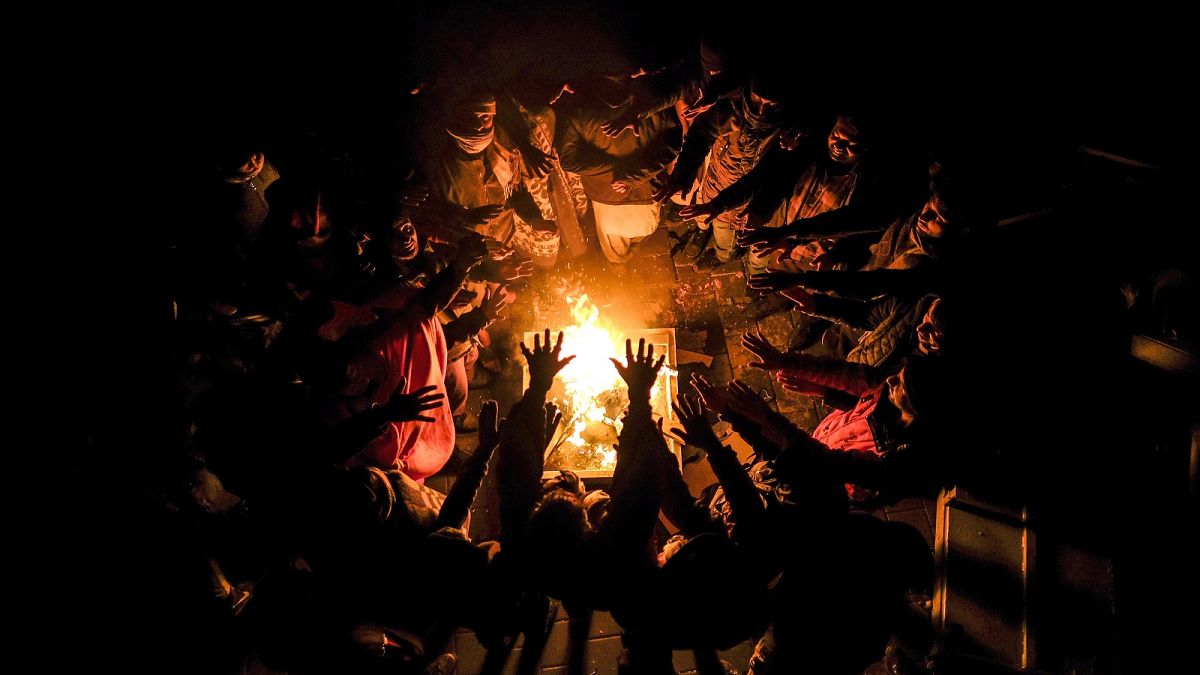Residents in the local town of Bihac have refused to allow the migrants to be moved to a centre there, leaving them stranded in the cold while disputes over their fate continue.
Nearly a thousand migrants are facing unforgiving winter conditions without shelter on Thursday after being forced to return to the burnt-out shell of their former camp in Bosnia.
Having spent 24 hours waiting on coaches to be taken to a former army barracks, they returned to their fire-ravaged camp after a lack of agreement on their re-housing.
The Lipa camp, on the Croatian border in north-western Bosnia, was set up as a temporary measure in the spring to deal with the COVID-19 pandemic but is devoid of any utilities and now shelters, leaving migrants with no refuge from icy winds and snow.
For days, local and international actors have been talking about a "humanitarian disaster" at the camp. They also note that it was foreseeable but they blame each other.
Since April, Lipa had been hosting more than a thousand people but was deemed unsuitable for winter. Consisting of large tents, the camp was never connected to the electricity grid and had no running water.
The International Organisation for Migration (IOM), which manages the site with other NGOs, decided to withdraw its teams for this reason and is calling on the authorities to reopen the reception centre in Bira, in the neighbouring town of Bihac.
This centre, located in a disused factory, had been closed at the beginning of October, just before the municipal elections, under pressure from the inhabitants.
It was an election promise that Mayor Suhret Fazlic is determined to keep: "We will not allow them to return. It's about our safety," he repeats over and over again.
On Wednesday evening, he joined dozens of residents gathered in front of the site to prevent any return of migrants.
His city of 56,000 inhabitants is located on the "Balkan route" and has been crossed since 2018 by tens of thousands of marchers fleeing conflicts and poverty in the Middle East, Asia and Africa.
There are currently around 8,500 of them in Bosnia, one of the poorest countries in Europe, according to Peter Van der Auweraert, head of the IOM in the country. Nearly 6,000 of them live in reception centres, while "between 2,500 and 3,000 have no shelter".
Many are squatting in abandoned buildings and houses, and regularly try to cross into Croatia, an EU member state which regularly refuses them entry from Bosnia.
According to Bosnian police, the fire on December 23 in Lipa was probably the work of the migrants themselves to protest against the withdrawal of the IOM.
"I have the impression that they wanted to provoke this situation," Fazlic said of the IOM's decision to withdraw.
A solution seemed to have been found on Tuesday when Bosnian security minister Selmo Cikotić announced that they would be housed in a former barracks in Bradina, a village in the south of the country. A thousand migrants then boarded buses.
But in the face of hostility from the inhabitants of this village, the buses never left and the migrants were escorted back to the burnt-out camp after a night and a day spent in the vehicles.
"Unfortunately, I learned to live like an animal. I don't care whether they take us elsewhere or leave us here. It's even better to stay here because the border is not far and I'm going to try the 'game' again in the next few days," Nuha, a 35-year-old Iranian, told AFP.
The term "game" is being used by migrants to designate their attempts to cross the border with Croatia in this mountainous and wooded region.
For Nuha, "the greatest pain" is that of being separated from his wife and their son born "on the road" in Greece. They have been in the UK for two years.
"Migrants are undesirable wherever you try to accommodate them," said Cikotić, who is also asking the municipal and cantonal authorities to allow the Bihac centre to reopen.
But he cannot order them to do so. Power in this ethnically-divided country is very decentralised. The local authorities can refuse the decisions of the federal government.
This shows very well the weakness of the Bosnian "state" with a political system that requires "a consensus between different levels," says Peter Van der Auweraert.
The UN Office of Human Rights has spoken out on Twitter against the "unacceptable suffering" of migrants.
"It is clear that the immediate and practical solution is the reopening of the Bira centre," European Commissioner Ylva Johansson said.
The head of European diplomacy Josep Borrell also called on local authorities "at all levels" to address the crisis "urgently" before working on "a long-term solution".
The EU has provided Bosnia with some €85.5 million since 2018 to help it cope with migration.
Husein Kavazović, the Grand Mufti in Bosnia, half of whose 3.5 million inhabitants are Muslims, denounced the "unacceptable treatment" of migrants.
"The inhuman and humiliating treatment of these people is a shame for Bosnia, but also for Europe," he said.
